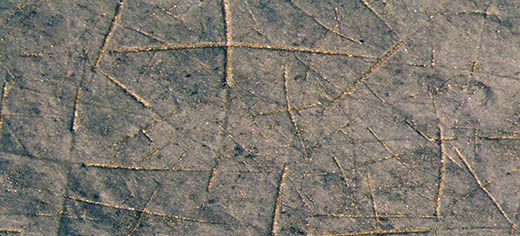
The first animals may have oxygenated the Earth's oceans - contrary to the traditional view that a rise in oxygen triggered their development, according to a study published in Nature Geoscience.
Professor Simon Poulton from the School of Earth and Environment at the University of Leeds, who is a co-author of the study, said: "³A major rise in atmospheric oxygen has long been proposed as the main driver for the evolution of our earliest animal ancestors. Our work suggests that the initial evolution of animals may have driven oxygenation – not vice versa.”
"This raises major questions about the oxygenation history of the planet – scientists need to find new ways to decipher how and when oxygen rose to the levels we thrive on today. ”
The study builds on the recent work of scientists in Denmark who found that sponges – the first animals to evolve – require only small amounts of oxygen.
Assuming that the oxygen levels in the atmosphere did not rise, the researchers considered alternative mechanisms by which the deep ocean could have been oxygenated during the Neoproterozoic Era (from 1,000 to 542 million years ago).
Crucial to determining oxygen levels in the deep ocean is the balance of oxygen supply and demand. Demand for oxygen is created by the sinking of dead organic material into the deep ocean. The new study argues that the first animals cleansed the ocean of this organic matter, thus allowing oxygen to accumulate.
Sponges feed by pumping water through their bodies, filtering out tiny particles of organic matter from the water, and thus helping oxygenate the seas that they live in. This naturally selects for larger phytoplankton – the tiny plants of the ocean – which sink faster, also reducing oxygen demand in the water.
By oxygenating more of the bottom waters of seas, the first filter-feeding animals inadvertently increased the removal of the essential nutrient phosphorus in the ocean. This in turn reduced the productivity of the whole ocean ecosystem, suppressing oxygen demand and thus oxygenating the deep ocean.
A more oxygen-rich ocean created ideal conditions for more mobile animals to evolve, because they have a higher requirement for oxygen. These included the first predatory animals with guts that started to eat one another, marking the beginning of a modern marine biosphere, with the type of food webs we are familiar with today.
Professor Tim Lenton of the University of Exeter, who led the new study, said: “The effects we predict suggest that the first animals, far from being a passive response to rising atmospheric oxygen, were the active agents that oxygenated the ocean around 600 million years ago.
“They created a world in which more complex animals could evolve, including our very distant ancestors.”
Further information
Professor Simon Poulton is available for interview. Please contact Sarah Reed, Press Officer, University of Leeds on 0113 34 34196 or email s.j.reed@leeds.ac.uk
The study, ‘Co-evolution of Eukaryotes and Ocean Oxygenation in the Neoproterozoic' was published in Nature Geoscience on 9 March.
The research was funded by NERC under the Life and the Planet scheme.